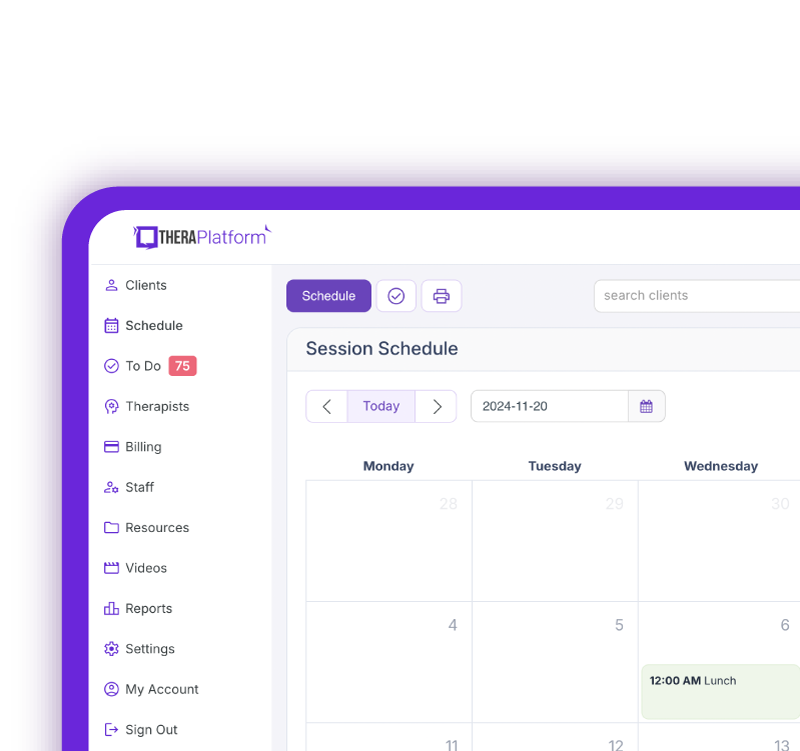Client portal

A client portal can help you run your therapy practice more seamlessly and efficiently. A client portal provides your clients with a secure and private tool to communicate with your practice, their therapist, and manage their account.
Summary
- A client portal provides a secure, HIPAA-compliant way for clients to schedule, communicate, pay, and access services online—saving time for both therapists and clients.
- Client portals can streamline practice operations, centralize documentation, and reduce administrative workload, allowing therapists to focus more on clinical care. Download my free private practice forms.
- Custom branding features within the portal help practices enhance their professional image and client engagement.
- Features like secure messaging, telehealth access, e-signatures, and automated payments as part of an EHR can improve client communication, increase fee collections, and support better therapy outcomes.
Streamline your practice with One EHR
- Scheduling
- Flexible notes
- Template library
- Billing & payments
- Insurance claims
- Client portal
- Telehealth
- E-fax

It is a digital gateway to your practice where your clients can engage in many services from the privacy of their computer, tablet, or phone. This article will take a closer look at how using a client portal in your practice can benefit you, your staff, and your clients.
What is a client portal?
A client portal is a unique and secure access point to your practice that you assign to your clients. Most electronic health record (EHR) programs provide a client portal as a function of their software.
It is very easy to give clients access to your therapy portal. Typically, you would forward the client an invitation to set up a client portal account as part of your process of establishing your client in your EHR system.
A client portal can provide clients with an online connection to the practice. With a client portal, clients, therapists, and other office staff can engage in important tasks related to client accounts from their computer, tablet, or phone.
Most client portals provide a secure and private opportunity for clients to:
- Request appointments
- Schedule appointments
- Cancel or reschedule appointments
- Complete and electronically sign paperwork
- Submit homework, assessment tools, etc.
- Securely message between the client and therapist
- Have a telehealth session
- Make any payments for services
- Share any documents from other providers
Watch this video see how TheraPlatform's client portal can simplify admin work
Uses of a client portal for your therapy practice
A client therapy portal can help your practice to:
- Run more efficiently
- Promote your branding
- Protect your client’s privacy
- Increase fee collection
- Enhance communication
We’ll look at each of these benefits in more detail.
Run your practice more efficiently
A client portal helps to centralize activities in your practice into one secure and accessible location. A portal makes it easier for everyone (clients, therapists, office staff) to access necessary information related to the practice and a client’s chart whenever it’s needed from a single location.
The client does not need to call the office to cancel, reschedule, or make an appointment. They can simply log onto the portal and access the calendar. They can log onto the portal to make a payment on their account, submit homework before the session, or sign any forms.
Therapists, assistants, and other staff in the office can also easily access the client’s record through the portal. The therapy portal allows you to confirm scheduling, communicate with clients, review homework prior to a session, request payment, and send forms for signatures in one convenient location.
When a practice runs more efficiently, your clients may receive better treatment outcomes. As a therapist, you can spend more time focusing on treating your clients vs. managing certain operations in your practice.
Practice Management + EHR + Telehealth
Manage more in less time in your practice with TheraPlatform

Promote the branding of your practice
Most often, the portal software allows you to personalize your portal with your branding. You can add your logo, tag lines, colors, or graphics to the portal, forms, and other documents. You can personalize the invitation that you send to your clients to join your therapy portal to include links to your website, social media, or email list. The therapy portal gives you another avenue to increase your brand visibility and promote your practice.
Protect the privacy of client information
A therapy client portal should be a secured and encrypted software program. Your portal will provide more protection and security for your client’s information. Your clients can feel more comfortable and safe engaging with your practice knowing that they have a private and secure way to take care of activities. A therapy portal can help to remove some of the worry, barriers, and stigma a client may experience related to going to therapy.
Through a therapy portal, clients can:
- Privately schedule appointments without worrying about someone overhearing their telephone conversation to your office.
- Securely pay their bill without worrying about anyone intercepting a paper bill.
- Communicate with private messaging to the therapist knowing that no one else will see the message or email.
- Exchange documents, sign paperwork, and share homework with privacy and security.
- Engage in a private telehealth session knowing that the session is HIPAA compliant and no one else can log into the session or intercept a call.
Increase fee collection rates
A client therapy portal can increase the likelihood of collecting fees for your sessions, missed appointments, and other services that your practice offers. The client portal should provide a safe way to store payment information within the client’s account. This function allows you to run the card for each service rather than waiting on the client to pay you.
The therapy portal also provides you with the ability to collect payment for services before the session. The client can log onto their portal before each session and make payment; or, you can run the charge for the session before you begin. The client portal should also allow you to send links to the client for payment, invoices, and superbills.
Enhance communication with clients
The therapy portal provides different opportunities to communicate with clients in-between sessions:
- Secure messaging
- Scheduling
- Submitting homework, assessment tools, and journal pages
- Payment collection
- Signing and submitting paperwork and documents
Through enhanced communication opportunities, the client portal can improve client engagement in therapy and improve treatment outcomes.
What to look for in a client portal
Most EHRs offer access to a client portal. This option helps to connect the portal to the client record. Depending on the EHR that you select, the therapy portal may offer different functions.
As you build and maintain your practice, you may prefer and need certain functionality for your client portal.
Some functions to consider include:
- HIPAA-compliant security and encryption (make sure the software has a Business Associate Agreement to sign.)
- Branding ability
- Mobile access
- Access through an app
- No charges to the client
- Compatibility with common computer operating systems (ex.: Microsoft Windows, Apple iOS, Android)
- Help functions
- User-friendly
- Allows clients to upload information
- Secure messaging
- Secure payment storage
- Processes online payments
- Sends invoices and superbills
- Online scheduling
- Telehealth
- Ability to share forms and obtain electronic signatures
- Instant messaging, chat features or text messaging
Free Resources for Therapists
Click below and help yourself to peer-created resources:

Running a private practice involves many working parts. A successful practice requires more than providing therapy sessions. A client therapy portal can help streamline many necessary functions and activities involved in managing your practice, communicating with your clients, and improving your revenue.
When a practice runs more efficiently, your clients will likely experience greater treatment outcomes and numerous other benefits, because you have more time and energy to devote to treatment.
Streamline your practice with One EHR
- Scheduling
- Flexible notes
- Template library
- Billing & payments
- Insurance claims
- Client portal
- Telehealth
- E-fax

Resources
TheraPlatform is an all-in-one EHR, practice management, and teletherapy software built for therapists to help them save time on admin tasks. It offers a 30-day risk-free trial with no credit card required and supports mental and behavioral health, SLPs, OTs, and PTs in group and solo practices.
More resources
- Benefits of EHR
- EHR overview
- The Ultimate Guide to Insurance Billing for Therapists
- The Ultimate Teletherapy E-book
- The Ultimate Guide to Starting a Private Therapy Practice
FAQs about using client portals in a therapy practice
What is a client portal in a therapy practice?
A client portal is a secure, HIPAA-compliant online platform where clients can schedule appointments, message their therapist, complete and sign paperwork, join telehealth sessions, and make payments.
How can a client portal improve practice efficiency?
Client portals centralize administrative tasks like scheduling, billing, secure document sharing, and communication, reducing workload for therapists and staff and allowing more time for client care.
What features should therapists look for in a client portal?
Key features include secure messaging, telehealth access, e-signatures, automated payments, mobile access, customizable branding, and encrypted data storage to protect client privacy.



